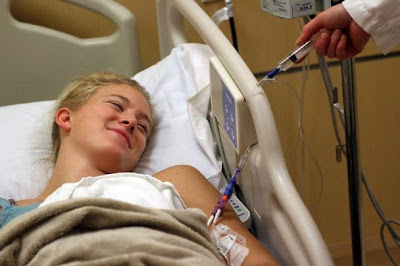COVINGTON — As a tear trickled down Katie Collier's cheek, she started to laugh.
The touted basketball recruit sat tucked into a leather chair with her long legs pulled up at an angle, her feet resting on an ottoman. She wore a black sweatsuit and her long, blond hair flowed down her right side.
She blinked back tears, but never stopped smiling.
During a time when most 18-year-olds with Division I college scholarship offers are making final decisions, the Seattle Christian senior tried to explain what it's like to have a dream diverted, a decision delayed.
Instead of selecting a school, Collier is dealing with acute promyelocytic leukemia (APL). She takes a chemotherapy pill at 9 a.m. and another at 9 p.m. and, until this week, made daily trips to Seattle Cancer Care Alliance for an arsenic drip.
The 18-year-old Collier faces each round of treatment for acute promyelocytic leukemia with a smile. After she finishes six months of treatment, doctors believe there is a good chance she will be cured.
But she isn't upset. She doesn't seem scared. Tears come with the territory, but she leans on laughter.
"It's more important to bring more smiles than tears," Collier said. "Who wants to be there soaking in tears? Not me."
When Collier woke up Sept. 24, she knew something was wrong. She was on her official visit to the University of Washington, and there was blood on her pillow. Her gums were bleeding.
She called her mom. Her parents were already tailgating before the Huskies' game against California.
"I don't feel good," Katie thought at the time. "I don't think I can make it through this football game."
When she met up with her parents, her mouth was still bleeding, so they went home. There is an urgent care center near her house, but she thought she just needed to rest.
"I do not want to go there," she told her parents. "I don't like doctors. No. No. No. It will all just wear off."
It didn't. She took a long nap and woke up about 7 p.m. Because she still didn't feel well, her mother, Ann, a registered nurse, decided Katie needed to see a doctor.
The urgent care center was just five minutes away. It was closed.
"Score! Just wait till morning," Collier thought at the time, even though there was so much blood coming from her gums she stuffed napkins in her mouth to staunch the bleeding.
Ann insisted they go to Valley Medical Center.
Collier had blood drawn in the emergency room. About an hour and a half after they arrived, doctors told Collier she had one of three things: mononucleosis, a rare virus or a blood disease.
She picked a positive perspective.
"OK, I have mono, no big deal," she thought. "I can deal with this."
When the doctor left, Collier noticed her mother was crying.
"Mom, what's wrong?" she asked.
"You know there's the possibility that you could have leukemia," said Ann, a breast-cancer survivor.
As they hugged in the hospital, Collier tried to soothe her mother. "It's no big deal. This is not leukemia."
With her father Mark, sister Megan, and brother Adam — Katie is the youngest of five children — at the hospital, two doctors delivered the preliminary diagnosis about midnight.
"Crap, two doctors, can't be a good sign," Collier thought.
They told her she had leukemia. Her family surrounded her. They held her hands. But it didn't seem real.
"When somebody tells you that, it's like, 'No, I don't. You got it wrong. Go check it again,' " said Collier, still smiling.
The preliminary diagnosis was acute myeloid leukemia (AML). The family had an iPad in the emergency room and checked the survival rate.
"The initial results that we were looking at, the survival rate for five years was 40 percent," Mark said. "That's what we all saw."
As the tablet computer was passed around the room — Katie didn't look at it — family members exchanged looks that said, "You've got to be kidding."
Collier was then taken by ambulance to the UW Medical Center. She arrived at 2 a.m. and had more blood drawn. She didn't get much sleep, and she hadn't eaten for almost 24 hours.
"That was hard, because I like to eat," said Collier, prompting Ann, Mark and Megan to start laughing.
While all this was going on, one thought kept running through the back of her mind: "Am I going to be able to play basketball again?" She didn't want to ask. One potential answer scared her more than the diagnosis.
When doctors thought she had AML, Ann said they told Collier in a roundabout way she was probably never going to play basketball again. However, APL carries a much different prognosis. After she finishes six months of treatment, there is a good chance she will be cured.
"They say there's like a 95 percent success rate to cure it," Mark said. "Not to put it into remission, but to cure it."
Once she finishes treatment, she can begin building her strength, working her way back to the court.
Her doctor "said it's mostly going to be me, what I can handle," Collier said. "Obviously I'm going to have to work harder and just kind of watch my nutrition, just kind of watch myself, because I get really tired."
Before her diagnosis, Collier was weighing scholarship offers from Washington, UCLA and Gonzaga. All of those programs have told the 6-foot-3 post player those scholarships are still on the table.
During her stay at the UW Medical Center, Collier had plenty of visitors — Mark estimates about 200. She was in isolation, so everyone who came to see her had to put on a gown, mask and gloves.
Most people walked into the room expecting somber silence. They were greeted by laughter.
There was so much noise coming out of the room, a man visiting his father stopped by. He didn't ask them to be quiet. He thanked them.
"I just wanted to tell you we love all that laughter," the man said. "Not many times do we get laughter coming down the hallway instead of crying."
Once Collier returned home, she started making daily trips from Covington to Seattle for treatment. Collier's first visit to the Seattle Cancer Care Alliance was surreal for Ann, who tucked her daughter into the same bed — in room No. 37 — she had been treated in during her battle with
breast cancer.
"It felt very wrong to be tucking her in," said Ann, who had her last treatment in July 2009.
Days before the diagnosis, Collier shared a school paper with her mother. It was a personal missive on Ann's struggle with breast cancer.
"My mom is one of the strongest people you will ever meet, she is so strong and will not allow those she loves to see her in a weak moment," Collier wrote.
Like mother, like daughter.
"I can't imagine ... I would be horrible in this situation, and from the very beginning, when Katie first found out, she didn't even cry. She was like, 'OK, I'll deal with this,' " said Megan, who is almost like a nurse for her sister, bringing her damp washcloths, a heating pad, SunChips, anything that could comfort her younger sibling.
As Collier endures the treatment, there are bad days. For weeks, she got most of her sleep during treatments, curled up with her sister in a hospital bed, arsenic flowing into her left arm.
Basketball player Katie Collier, right, receives chemotherapy for her leukemia while sister Megan curls up next to her. Mother Ann, left, is a breast cancer survivor. After a recent treatment, Collier got out of the hospital bed, pulled on a black University of Hawaii sweatshirt and slipped on a pair of furry boots. She wanted to visit her horse, Harley, a black thoroughbred.
"Like the motorcycle?" someone asked.
"Exactly," she said.
Then she smiled.






















































